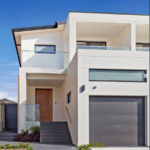Duplex vs. Twin Home: What’s the Difference?
When considering attached housing options, the terms duplex and twin home often arise. While they may appear similar, understanding their distinctions is crucial for making an informed decision. This article delves into the key differences between duplexes and twin homes, focusing on aspects such as ownership, privacy, maintenance responsibilities, and more.
What Is a Duplex?
A duplex is a single building that contains two separate living units. These units can be arranged side by side or stacked one above the other. The defining characteristic of a duplex is that both units share a common lot and are typically owned by one party, though in some cases, they may be individually owned.
Key Features of a Duplex:
- Shared Lot: Both units are situated on the same parcel of land.
- Unified Ownership: Often, a duplex is owned by a single entity, though there are exceptions.
- Shared Maintenance: Responsibilities for upkeep, such as lawn care and exterior repairs, are typically shared between the units.
- Potential for Rental Income: Owners can live in one unit and rent out the other, generating income.
What Is a Twin Home?
A twin home, also known as a semi-detached house, consists of two separate homes that share a common wall but are situated on separate lots. Each unit is individually owned, including the land beneath it, providing a level of autonomy not typically found in duplexes.
Key Features of a Twin Home:
- Separate Lots: Each unit sits on its own parcel of land.
- Individual Ownership: Owners have full control over their respective units and land.
- Independent Maintenance: Each homeowner is responsible for the upkeep of their property, including the exterior and yard.
- Enhanced Privacy: With separate entrances and no shared hallways, twin homes often offer more privacy than duplexes.
Ownership and Legal Considerations
One of the most significant differences between duplexes and twin homes lies in ownership structures.
- Duplex: Typically, a duplex is considered a multi-family dwelling. This means that if both units are owned by one party, they share a single deed and mortgage. In cases where each unit is individually owned, the property may be subdivided, and each owner holds title to their respective unit and a share of the common land.
- Twin Home: Each twin home is individually titled, meaning each owner holds a separate deed for their unit and the land beneath it. This arrangement is more akin to owning a single-family home, with the added benefit of sharing a common wall.
Privacy and Noise Levels
Privacy is a crucial factor for many when choosing a home.
- Duplex: Since duplexes often have multiple shared walls, residents may experience more noise from neighboring units. The level of privacy can vary depending on the layout and construction quality.
- Twin Home: With only one shared wall and separate entrances, twin homes generally offer better privacy. The distance between units and individual ownership of the land contribute to a more secluded living experience.
Maintenance Responsibilities
Maintenance duties can influence the overall living experience.
- Duplex: In a duplex, maintenance responsibilities are often shared between the two units. This can include tasks like lawn care, snow removal, and exterior repairs. The specifics can vary depending on the ownership arrangement and any agreements between the parties involved.
- Twin Home: Each homeowner is solely responsible for the maintenance of their property, including the yard and exterior. This autonomy allows for more control over the property’s upkeep but also means that homeowners bear the full cost and effort of maintenance.
Cost and Financing
The financial aspects of purchasing a duplex versus a twin home can differ.
- Duplex: Financing a duplex may involve securing a multi-family loan, which can have different terms and interest rates compared to loans for single-family homes. Additionally, if one unit is rented out, the rental income may be considered when qualifying for a mortgage.
- Twin Home: Since twin homes are individually owned, they are typically financed like single-family homes. This can make the purchasing process more straightforward, with potential access to conventional mortgage options and possibly lower interest rates.
Resale Value and Market Appeal
Understanding the resale potential is essential for long-term investment.
- Duplex: The resale value of a duplex can be influenced by factors such as rental income potential and the condition of both units. However, the market for duplexes may be more limited, as some buyers prefer single-family homes.
- Twin Home: Twin homes often appeal to buyers seeking the benefits of homeownership without the maintenance of a detached single-family home. Their resale value can be strong, especially in markets where single-family homes are in high demand.
Conclusion
Both duplexes and twin homes offer unique advantages and considerations. A duplex may be suitable for those seeking shared ownership and the potential for rental income, while a twin home provides greater privacy and individual control over the property. Your choice between the two should align with your personal preferences, financial situation, and long-term goals.








